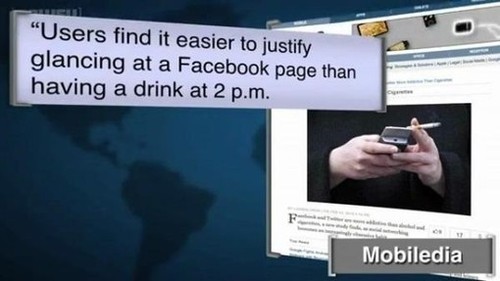Jeff Einstein's Blog, page 2
October 29, 2013
Council on Children and Media conference to hear of kids with gaming addictions – Courier Mail
See on Scoop.it – Media Addiction
Council on Children and Media conference to hear of kids with gaming addictions
Courier Mail
Up to 10 per cent of children fall into the category of overusing video games and a small number of those children develop addictions, Dr Tam said.
See on www.couriermail.com.au
Media Addiction in Kids: How to Set Family Limits
See on Scoop.it – Media Addiction
From television to cell phones, iPads, and social media, media use has become a key part of most people’s lives in recent years.
See on networkedblogs.com
Here’s Scientific Proof that You Are Addicted to Social Networks – Everything PR
See on Scoop.it – Media Addiction
Here’s Scientific Proof that You Are Addicted to Social Networks Everything PR If you are diagnosed with Internet addiction (and social media addiction is synonymous for that matter) you can now join a voluntary, 10-day in-patient treatment program…
See on everything-pr.com
Social media addiction more addictive than smoking
See on Scoop.it – Media Addiction
Social media addiction is real, whether or not it is a recognized condition or illness in the clinicians journal of diagnosis, the DSM-V.
See on www.examiner.com
F..k Off in the Name of Civility
The following article by yours truly appeared in on March 22nd, 2012…
Received a recent Mother Jones story link in an email from a dear friend the other day. The story examined a perceived rise in misogyny. The lead, of course, featured Rush Limbaugh’s recent attack on Sandra Fluke, but later in the story, the author speculated that the perceived rise of misogyny might be owed to the suddenly public nature of everything and everyone, thanks to the Internet.
With the possible exception of my pre-teen daughter, all the women I know are more than capable of defending themselves, so I won’t even comment on any perceived rise in misogyny — or on any of the talking-head buffoons on either side of the political spectrum. Except to say that nothing is profane when everything is profane. But here’s what I replied to my friend.
Don’t know if misogyny is on the rise. Then again, why not? Seems like everything else is (except peace of mind). Seems to me that we tend to find whatever it is we’re looking for nowadays, at least online. But isn’t the whole point of search engines to justify the query, however spectacular, base or banal?
Google pornography and you’ll find a universe of nothing but pornography. Google misogyny and all you’ll find are articles and videos about misogyny. Either way, we sleep with dogs and wake up with fleas.
Fast information, like fast food, always comes at a price: the ancient Vedic Seers observed several thousand years ago that we have a tendency to become our attention. Dreams — they knew for certain — are powerful. Perhaps the pursuit of everything at once, all the time, simply leaves no room at the end of the day for civility. Perhaps freedom of speech will die as it becomes too expensive to sustain.
Real freedom of speech is far too politically incorrect and chaotic to sustain for the biggest TV and online networks, and political correctness is a poor surrogate for civility, a ham-handed attempt to enforce values in a culture that traded them years ago in a massive drug deal for 24/7 access to reality TV and all its online derivatives.
That’s why we find whatever freedom of speech still remains on TV so far up the dial these days, and buried so far off the beaten path online. Generally speaking, the farther up the dial we go, the less political correctness and the more freedom we encounter.
Civility, of course, ended more than a generation ago, with the arrival of MTV. But that’s what happens when we hand the keys to the kingdom over to a generation too young to remember Barney Fife. Then again, why bother to remember anything when we can Google everything then proclaim ourselves as instantly knowledgeable and wise? As the Egyptian King Thamus told the god Theuth, the proud inventor of writing (and lisps):
“Those who acquire it will cease to exercise their memory and become forgetful; they will rely on writing to bring things to their remembrance by external signs instead of by their own internal resources. What you have discovered is a receipt for recollection, not for memory. And as for wisdom, your pupils will have the reputation for it without the reality: they will receive a quantity of information without proper instructions, and in consequence be thought very knowledgeable when they are for the most part quite ignorant. And because they are filled with the conceit of wisdom instead of real wisdom, they will be a burden to society.”
Civility, like freedom, is a casualty of our addictions to all things media, an unfortunate concession to the digitally scaled conceit of wisdom.
October 25, 2013
New Yorker Front Cover — a Page from The Media Addict’s Handbook
Jeff Einstein on the Demise of Newspapers…
From The Media Addict’s Handbook, Chapter 6: Spiritual Decline in the Great Age of Mediation…
Time is the only real prerequisite to all meaningful ritual. Case in point: the real reason for the rapid decline of the newspaper industry over the past decade has less to do with the digital proliferation of other, cheaper news sources or the elevated costs of news gathering, publishing and distribution, and more to do with the disappearance of the lifestyle that once supported the industry. The truth is that no one these days sets aside a few quiet moments in the morning or evening to sit down and read the newspaper. Wondering what happened to the newspaper industry is like clear-cutting all the old-growth forests and wondering what the hell happened to all the spotted owls. Wondering what happened to the quality of our lives is like damning all the rivers and wondering what happened to all the salmon. Good things disappear when we destroy the environments that support them.
Over the years we become less attached to the sacred and more invested in the profane as we divert more and more of our time from the quietude and serenity of the sacred to the self-will run riot of the profane.
Jeff Einstein
The Media Addict’s Handbook
October 24, 2013
Stunning Power
A perfect example of why we are so addicted to the media. This performance by artist, teacher and father Pages Matam is stunning…
The Inimitable George Carlin…
From the master himself, George Carlin…
The paradox of our time in history is that we have taller buildings but shorter tempers, wider freeways, but narrower viewpoints. We spend more, but have less, we buy more, but enjoy less. We have bigger houses and smaller families, more conveniences, but less time. We have more degrees but less sense, more knowledge, but less judgment, more experts, yet more problems, more medicine, but less wellness.
We drink too much, smoke too much, spend too recklessly, laugh too little, drive too fast, get too angry, stay up too late, get up too tired, read too little, watch TV too much, and pray too seldom. We have multiplied our possessions, but reduced our values. We talk too much, love too seldom, and hate too often.
We’ve learned how to make a living, but not a life. We’ve added years to life not life to years. We’ve been all the way to the moon and back, but have trouble crossing the street to meet a new neighbor. We conquered outer space but not inner space. We’ve done larger things, but not better things.
We’ve cleaned up the air, but polluted the soul. We’ve conquered the atom, but not our prejudice. We write more, but learn less. We plan more, but accomplish less. We’ve learned to rush, but not to wait. We build more computers to hold more information, to produce more copies than ever, but we communicate less and less.
These are the times of fast foods and slow digestion, big men and small character, steep profits and shallow relationships. These are the days of two incomes but more divorce, fancier houses, but broken homes. These are days of quick trips, disposable diapers, throwaway morality, one night stands, overweight bodies, and pills that do everything from cheer, to quiet, to kill. It is a time when there is much in the showroom window and nothing in the stockroom. A time when technology can bring this letter to you, and a time when you can choose either to share this insight, or to just hit delete…
Jeff Einstein
The Media Addict’s Handbook
October 23, 2013
The Consolidation of Power
Excerpted from The Media Addict’s Handbook — A Brief History of Digital, this passage describes one of three basic trends that marked the digital and media landscapes in the first decade of the 21st-century…
The first decade of the 21st century was one of immense mergers and acquisitions among already enormous media franchises, especially online. In addition, huge amounts of investment capital were put to work on commercial technologies that would a) rapidly expand and set the stage for broadband access and b) track, analyze and optimize consumer behavioral data online. Sure enough, broadband access soon became the de facto standard while the digital advertising and marketing industry – in response to legitimate consumer concerns about the volume and integrity of the behavioral data tracked, analyzed and optimized – solemnly promised on a stack of shrink-wrapped user manuals to regulate itself, and embarked on a mission to educate consumers not to worry so much about potential abuses of personal data. Your data, they promised, are safe, and the fact that we track, analyze, parse and sell them to anyone who asks is merely the price you pay for a far better and far more efficient online experience. “Trust us,” they said.
Of course, soon after 9/11 government security and intelligence agencies were granted broad powers by Congress and executive order to deploy the same basic digital tracking technologies in the war against terrorism with the same basic refrain: Your data are safe, and the fact that we track, analyze, parse and share them is the price you pay for a secure homeland. “Trust us,” they said. Meanwhile, the government directive to the commercial high-tech and media industries was likewise simple and to the point: “We now have the legal right and legitimate excuse to subpoena and examine your customer data pretty much whenever we want. So let’s do lunch and partner up.”Thus we were taught by industry and government agents alike not to worry about all of the digital tracking and spying technologies we couldn’t see at work behind the scenes. “Pay no attention” they told us, “to the man behind the curtain.”Meanwhile, those who stood the most to gain by selling digital technologies and media to everyone on the planet evangelized the liberating, lifestyle-enhancing and presumed democratizing effects of their products and services, and proclaimed the entire world on-demand and at our fingertips. True enough, perhaps, but behind the scenes the real byproducts of so much digital power in the hands of so many huge institutions were a) corporatist collusion of private and government interests on a massive scale, b) the equally massive expansion of immensely amplified institutional power along with c) the rise of unmanageable complexity and the virtual end of institutional accountability.
The medium was the message and the true message of digital media was buried far beneath the graphic user interfaces that whisked us like magic from one virtual reality to another. The medium was the message and the true message of digital media was far less about the democratization of media as advertised and far more about the consolidation, expansion and unaccountability of institutional power.




